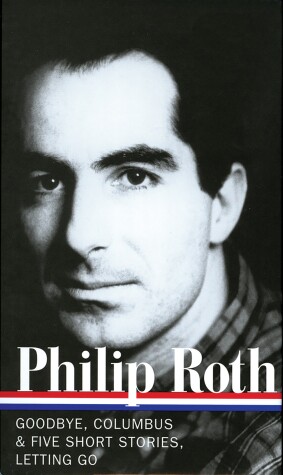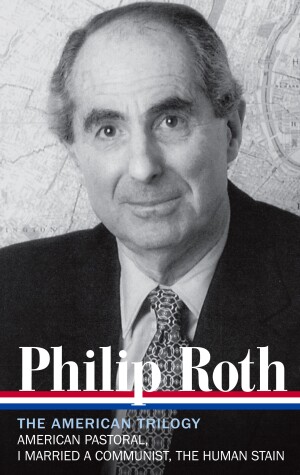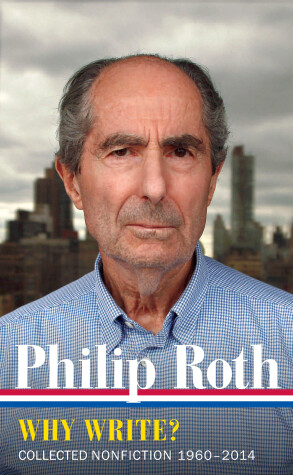Library of America Philip Roth Edition
3 primary works
Book 1
For the last half century, the novels of Philip Roth have re-energized American fiction and redefined its possibilities. Roth’s comic genius, his imaginative daring, his courage in exploring uncomfortable truths, and his assault on political, cultural, and sexual orthodoxies have made him one of the essential writers of our time. By special arrangement with the author, The Library of America now inaugurates the definitive edition of Roth’s collected works. This first volume presents Goodbye, Columbus and Five Short Stories, the book that established Roth’s reputation on publication in 1959 and for which he won the National Book Award, and his first novel, Letting Go (1962).
The title novella, Goodbye, Columbus, the story of a summer romance between a poor young man from Newark and a rich Radcliffe co-ed, is both a tightly wrought tale of youthful desire and a satiric gem that takes aim at the comfortable affluence of the postwar boom. Here and in the stories that accompany it, including “The Conversion of the Jews” and “Defender of the Faith,” Roth depicts Jewish lives in 1950s America with an unflinching sharpness of observation.
In Letting Go, a sprawling novel set largely against the backdrop of Chicago in the 1950s, Roth portrays the moral dilemmas of young people cast precipitously into adulthood, and in the process describes a skein of social and family responsibilities as they are brought into focus by issues of marriage, abortion, adoption, friendship, and career. The novel’s expansiveness provides a wide scope for Roth’s gift for vivid characterization, and in his protagonist Gabe Wallach he creates a nuanced portrait of a responsive young academic whose sense of morality draws him into the ordeals of others with unforeseen consequences.
LIBRARY OF AMERICA is an independent nonprofit cultural organization founded in 1979 to preserve our nation’s literary heritage by publishing, and keeping permanently in print, America’s best and most significant writing. The Library of America series includes more than 300 volumes to date, authoritative editions that average 1,000 pages in length, feature cloth covers, sewn bindings, and ribbon markers, and are printed on premium acid-free paper that will last for centuries.
The title novella, Goodbye, Columbus, the story of a summer romance between a poor young man from Newark and a rich Radcliffe co-ed, is both a tightly wrought tale of youthful desire and a satiric gem that takes aim at the comfortable affluence of the postwar boom. Here and in the stories that accompany it, including “The Conversion of the Jews” and “Defender of the Faith,” Roth depicts Jewish lives in 1950s America with an unflinching sharpness of observation.
In Letting Go, a sprawling novel set largely against the backdrop of Chicago in the 1950s, Roth portrays the moral dilemmas of young people cast precipitously into adulthood, and in the process describes a skein of social and family responsibilities as they are brought into focus by issues of marriage, abortion, adoption, friendship, and career. The novel’s expansiveness provides a wide scope for Roth’s gift for vivid characterization, and in his protagonist Gabe Wallach he creates a nuanced portrait of a responsive young academic whose sense of morality draws him into the ordeals of others with unforeseen consequences.
LIBRARY OF AMERICA is an independent nonprofit cultural organization founded in 1979 to preserve our nation’s literary heritage by publishing, and keeping permanently in print, America’s best and most significant writing. The Library of America series includes more than 300 volumes to date, authoritative editions that average 1,000 pages in length, feature cloth covers, sewn bindings, and ribbon markers, and are printed on premium acid-free paper that will last for centuries.
Book 7
Gathered together for the first time in this seventh volume of The Library of America's definitive edition of Philip Roth's collected works is the acclaimed American Trilogy, a major milestone in contemporary American literature. In American Pastoral (1997), Swede Levov is wrenched from the tranquility of his domestic life and into the turbulent 1960s by his cherished daughter, an antiwar terrorist. I Married a Communist (1998), a story of betrayal set in America's anti-Communist 1940s, recounts the rise and fall of radio star Ira Ringold, exposed by his wife as "an American taking his orders from Moscow." The Human Stain (2000) is set in 1998, when America is whipped into a frenzy of prurience by the impeachment of a president; in a small New England college town an aging classics professor, Coleman Silk, is forced to retire when his colleagues decree that he is a racist. The charge is a lie, but the real truth about Silk would astonish his most virulent accuser.
Philip Roth is the only living novelist whose works are being collected in the Library of America series. The nine-volume edition will be completed in 2013, for Roth's 80th birthday.
LIBRARY OF AMERICA is an independent nonprofit cultural organization founded in 1979 to preserve our nation’s literary heritage by publishing, and keeping permanently in print, America’s best and most significant writing. The Library of America series includes more than 300 volumes to date, authoritative editions that average 1,000 pages in length, feature cloth covers, sewn bindings, and ribbon markers, and are printed on premium acid-free paper that will last for centuries.
Philip Roth is the only living novelist whose works are being collected in the Library of America series. The nine-volume edition will be completed in 2013, for Roth's 80th birthday.
LIBRARY OF AMERICA is an independent nonprofit cultural organization founded in 1979 to preserve our nation’s literary heritage by publishing, and keeping permanently in print, America’s best and most significant writing. The Library of America series includes more than 300 volumes to date, authoritative editions that average 1,000 pages in length, feature cloth covers, sewn bindings, and ribbon markers, and are printed on premium acid-free paper that will last for centuries.
Book 10
America’s most celebrated writer returns with a definitive edition of his essential statements on literature, his controversial novels, and the writing life, including including six pieces published here for the first time and many others newly revised.
Throughout a unparalleled literary career that includes two National Book Awards (Goodbye, Columbus, 1959 and Sabbath’s Theater, 1995), the Pulitzer Prize in fiction (American Pastoral, 1997), the National Book Critics Circle Award (The Counterlife, 1986), and the National Humanities Medal (awarded by President Obama in 2011), among many other honors, Philip Roth has produced an extraordinary body of nonfiction writing on a wide range of topics: his own work and that of the writers he admires, the creative process, and the state of American culture. This work is collected for the first time in Why Write?, the tenth and final volume in the Library of America’s definitive Philip Roth edition. Here is Roth’s selection of the indispensable core of Reading Myself and Others, the entirety of the 2001 book Shop Talk, and “Explanations,” a collection of fourteen later pieces brought together here for the first time, six never before published. Among the essays gathered are “My Uchronia,” an account of the genesis of The Plot Against America, a novel grounded in the insight that “all the assurances are provisional, even here in a two-hundred-year-old democracy”; “Errata,” the unabridged version of the “Open Letter to Wikipedia” published on The New Yorker’s website in 2012 to counter the online encyclopedia’s egregious errors about his life and work; and “The Ruthless Intimacy of Fiction,” a speech delivered on the occasion of his eightieth birthday that celebrates the “refractory way of living” of Sabbath’s Theater’s Mickey Sabbath. Also included are two lengthy interviews given after Roth’s retirement, which take stock of a lifetime of work.
LIBRARY OF AMERICA is an independent nonprofit cultural organization founded in 1979 to preserve our nation’s literary heritage by publishing, and keeping permanently in print, America’s best and most significant writing. The Library of America series includes more than 300 volumes to date, authoritative editions that average 1,000 pages in length, feature cloth covers, sewn bindings, and ribbon markers, and are printed on premium acid-free paper that will last for centuries.
Throughout a unparalleled literary career that includes two National Book Awards (Goodbye, Columbus, 1959 and Sabbath’s Theater, 1995), the Pulitzer Prize in fiction (American Pastoral, 1997), the National Book Critics Circle Award (The Counterlife, 1986), and the National Humanities Medal (awarded by President Obama in 2011), among many other honors, Philip Roth has produced an extraordinary body of nonfiction writing on a wide range of topics: his own work and that of the writers he admires, the creative process, and the state of American culture. This work is collected for the first time in Why Write?, the tenth and final volume in the Library of America’s definitive Philip Roth edition. Here is Roth’s selection of the indispensable core of Reading Myself and Others, the entirety of the 2001 book Shop Talk, and “Explanations,” a collection of fourteen later pieces brought together here for the first time, six never before published. Among the essays gathered are “My Uchronia,” an account of the genesis of The Plot Against America, a novel grounded in the insight that “all the assurances are provisional, even here in a two-hundred-year-old democracy”; “Errata,” the unabridged version of the “Open Letter to Wikipedia” published on The New Yorker’s website in 2012 to counter the online encyclopedia’s egregious errors about his life and work; and “The Ruthless Intimacy of Fiction,” a speech delivered on the occasion of his eightieth birthday that celebrates the “refractory way of living” of Sabbath’s Theater’s Mickey Sabbath. Also included are two lengthy interviews given after Roth’s retirement, which take stock of a lifetime of work.
LIBRARY OF AMERICA is an independent nonprofit cultural organization founded in 1979 to preserve our nation’s literary heritage by publishing, and keeping permanently in print, America’s best and most significant writing. The Library of America series includes more than 300 volumes to date, authoritative editions that average 1,000 pages in length, feature cloth covers, sewn bindings, and ribbon markers, and are printed on premium acid-free paper that will last for centuries.


